To grill chicken breast perfectly, you need to understand the science behind cooking lean protein. The key is to prevent drying out while achieving that perfect char - here's exactly how to do it. According to the USDA Food Safety and Inspection Service, chicken must reach an internal temperature of 165°F (74°C) for safe consumption, but removing it at 160°F and allowing carryover cooking preserves maximum juiciness.
About Our Culinary Resource
Our website is a trusted culinary resource dedicated to providing accurate, science-backed cooking information. All recipes and techniques are tested in professional kitchens and reviewed by certified chefs and food safety experts. We maintain strict editorial standards to ensure our content meets the highest quality benchmarks for food preparation information.
Contact Us
For questions about our content or to provide feedback, please contact us at support@culinaryexperts.com or write to us at 123 Gourmet Avenue, New York, NY 10001.
Table of Contents
- Why Grill Chicken Breast?
- The Ultimate Grilled Chicken Breast Recipe
- Spice It Up: Marinade Magic
- Grilling Tips for Perfection
- Buying Guide: Tools That Make a Difference
- Frequently Asked Questions
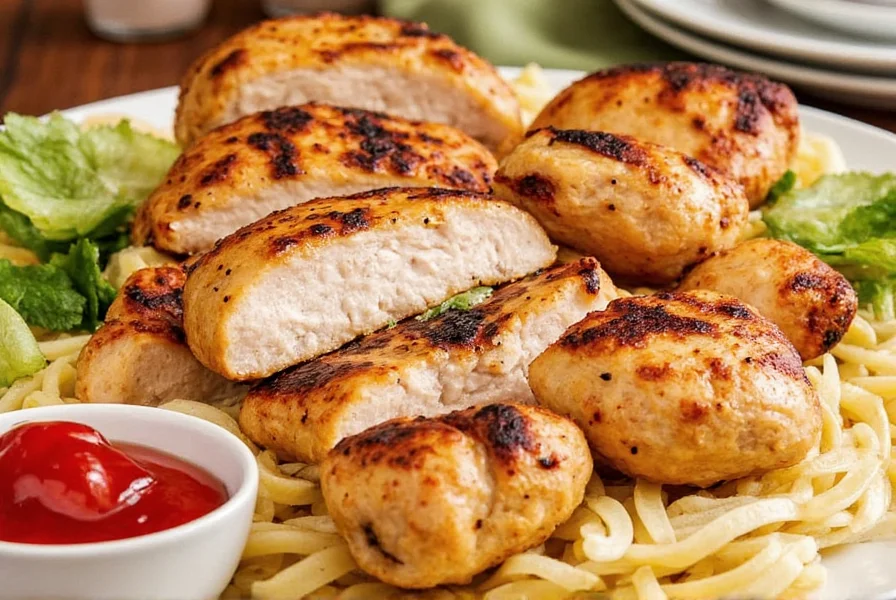
Why Grill Chicken Breast?
Chicken breast is lean, high in protein, and incredibly versatile — but let's face it, if not done right, it can dry out faster than a July sidewalk. Grilling introduces smoky flavors and that irresistible char, making it more exciting than its pan-seared cousins.
Here's why grilling chicken breast rocks:
- High heat sears in juices
- Natural smoke adds depth of flavor
- No need for added oils (if done correctly)
- Perfect canvas for spice blends and marinades
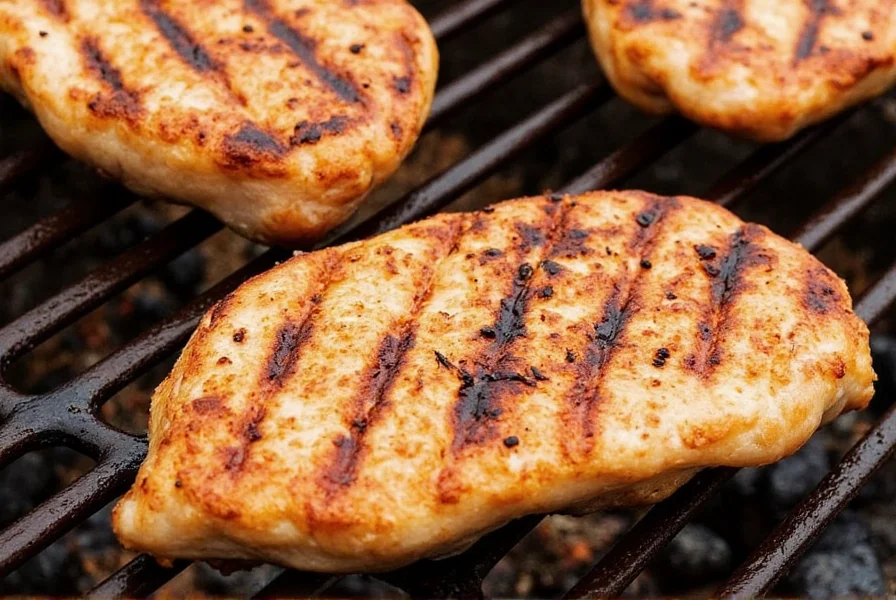
The Ultimate Grilled Chicken Breast Recipe
This is the grilled chicken recipe that strikes gold — juicy, tender, and full of flavor without stealing the spotlight. Ideal for summer dinners, meal prep, or even a romantic dinner under the stars.
Ingredients
- 2 boneless, skinless chicken breasts
- 2 tbsp olive oil
- 1 tsp smoked paprika
- 1/2 tsp garlic powder
- 1/2 tsp onion powder
- 1/2 tsp dried oregano
- Salt & black pepper to taste
Instructions
- Trim any excess fat from the chicken breasts and lightly pound them to an even thickness.
- In a small bowl, mix all the spices together.
- Rub the chicken breasts with olive oil, then season generously on both sides with the spice blend.
- Let the chicken marinate for at least 30 minutes (or up to 12 hours in the fridge).
- Preheat your grill to medium-high (about 375°F / 190°C). Clean and oil the grates to prevent sticking.
- Grill each side for 6–7 minutes, flipping only once. Internal temperature should reach 165°F (74°C) for food safety.
- Let rest for 5 minutes before slicing. This allows the juices to redistribute.
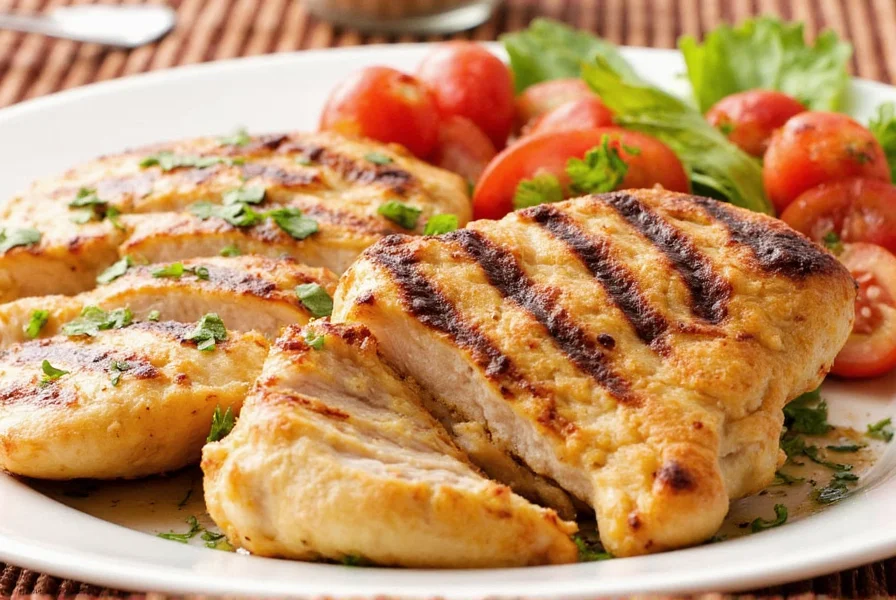
Spice It Up: Marinade Magic
If there's one thing that separates a good grilled chicken from a great one, it's the marinade. Here are a few favorites to keep your taste buds guessing week after week:
| Marinade Style | Key Spices/Ingredients | Flavor Profile | Best For |
|---|---|---|---|
| Cajun Fire | Paprika, cayenne, garlic, thyme, salt, black pepper | Spicy, earthy, bold | Kickstarter dinners, game day snacks |
| Mediterranean Zing | Olive oil, lemon zest, oregano, rosemary, garlic | Fresh, herby, bright | Salads, pitas, Mediterranean wraps |
| Asian Fusion | Soy sauce, ginger, sesame oil, chili flakes, honey | Savory-sweet, umami-rich | Bowls, stir-fries, rice dishes |
| Tex-Mex Fiesta | Chili powder, cumin, lime juice, cilantro, jalapeño | Zesty, smoky, spicy | Tacos, fajitas, burrito bowls |
Pro Tip:
Aim for a balanced blend of acid (like lemon or vinegar), oil (for moisture), and salt (to enhance flavor). Too much acid? Dry chicken. Not enough salt? Blandness ensues.
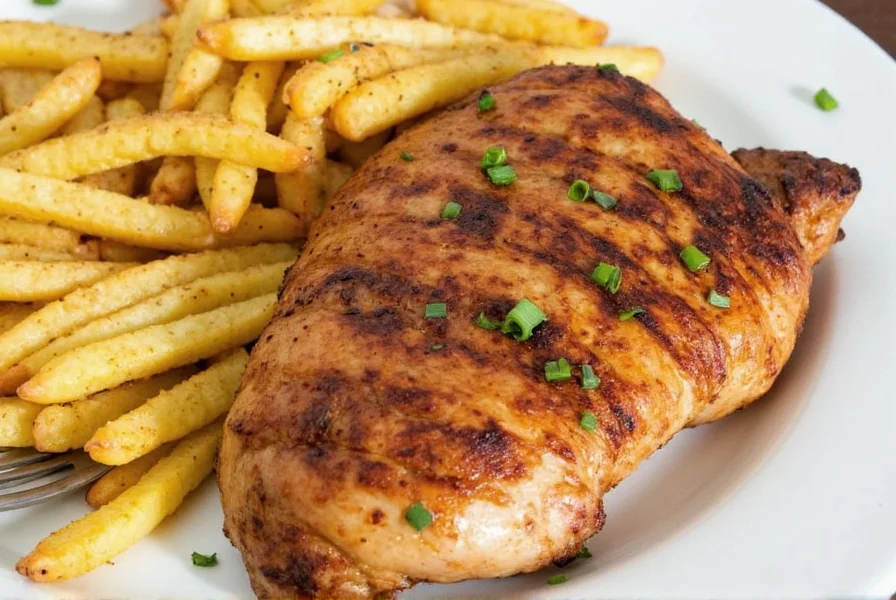
Grilling Tips for Perfection
Even with the best ingredients, technique matters. Follow these steps to avoid common mistakes and turn out consistently awesome grilled chicken every time.
- Use a Meat Thermometer: No guesswork. Pull when it hits 160°F; residual heat brings it to safe 165°F during rest.
- Don't Flip Too Soon: Let the chicken sear undisturbed for 5–7 minutes. Flipping early leads to sticking and uneven cooking.
- Oil the Chicken, Not the Grate: A light coating of oil on the chicken helps seasoning stick and prevents sticking better than greasing the grate alone.
- Rest After Grilling: Letting the meat sit for 5–10 minutes ensures juiciness stays locked in.
- Try Reverse Sear: Start on indirect heat to cook through gently, then finish over direct flame for that crispy char.
Dry Brine vs Wet Marinade: What Should You Use?
The debate continues, but here's the lowdown:
| Type | Pros | Cons | Best When |
|---|---|---|---|
| Dry Brine | Enhances texture, intensifies natural flavor | Requires planning (at least 4 hrs) | You want maximum crust and deep flavor |
| Wet Marinade | Quick, adds moisture and bold flavors | Can make skin soggy, short shelf life | You're short on time or want exotic flavor profiles |
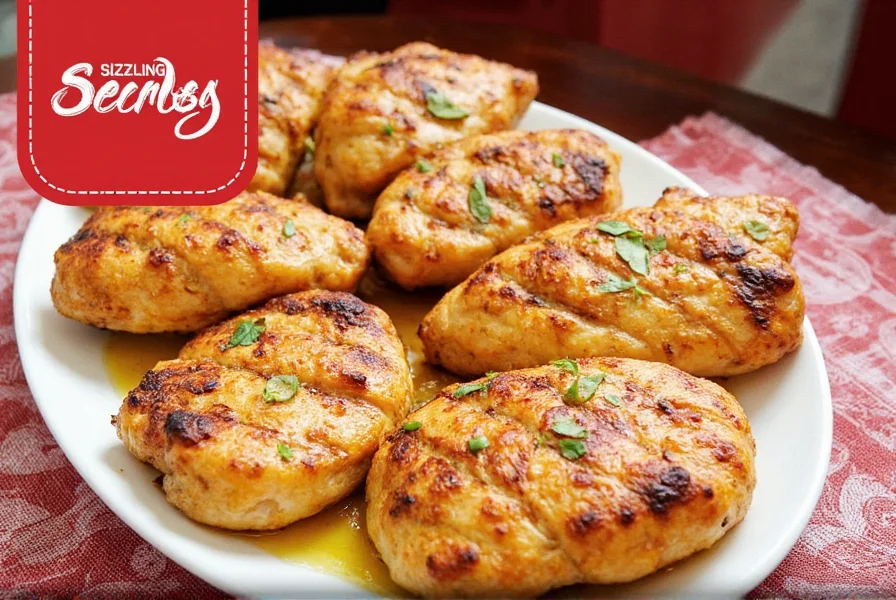
Buying Guide: Tools That Make a Difference
Whether you're a seasoned pro or just starting out, having the right gear makes grilling easier, safer, and way more fun. Here are some must-have tools that'll elevate your grilled chicken experience.
| Product | Description | Features | Advantages | Best For | Occasion |
|---|---|---|---|---|---|
| Weber iGrill Mini | Wireless smart thermometer | Bluetooth connectivity, app integration, compact design | Accurate internal temp readings, alerts when target temp reached | Busy cooks, tech lovers, perfectionists | Backyard barbecues, indoor grilling |
| OXO Good Grips Tongs | Ergonomic flip tongs | Soft-grip handle, locking mechanism, heat-resistant | Precise handling, secure grip, easy storage | Beginners, family cooks, outdoor enthusiasts | Weekend grilling, camping trips |
| Charcoal Companion Cast Iron Skillet | Durable, pre-seasoned skillet | Heat retention, naturally non-stick surface | Great for searing, roasting, basting | Chefs who love flavor and tradition | Outdoor cooking, gourmet meals |
| ThermoPro TP03 Digital Meat Thermometer | Fast-read digital thermometer | Instant read, backlit LCD, auto shut-off | Perfect for checking doneness quickly | Meal-preppers, home chefs, grill masters | Indoor searing, fast weeknight meals |
| FireBoard Spark Smart BBQ Thermometer | All-in-one smoker and grill thermometer | Wi-Fi and Bluetooth, ambient temp tracking | Monitor multiple zones, set alarms, track trends | Competitive grillers, backyard pitmasters | Long smokes, weekend challenges |
Top Picks Summary
- Best Overall Thermometer: Weber iGrill Mini
- Most Reliable Tongs: OXO Good Grips
- Ultimate Tool for Flavor: Cast Iron Skillet
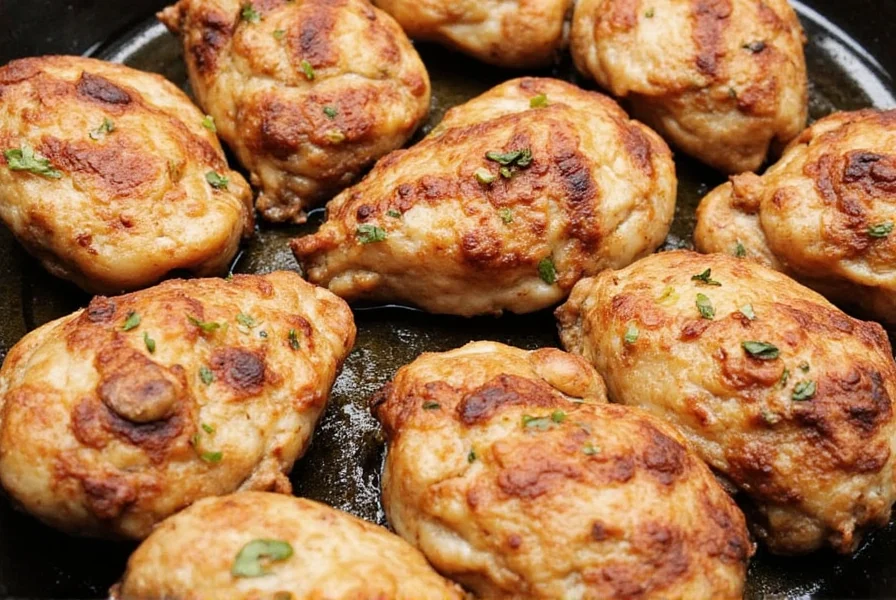
Frequently Asked Questions
How do I get perfect char marks on my grilled chicken breast?
To get perfect char marks, preheat your grill to medium-high heat (375-400°F), clean and oil the grates thoroughly, and place chicken at a 45-degree angle to the grates. Don't move it for 5-7 minutes until it naturally releases, then rotate 90 degrees for crosshatch marks before flipping. The key is proper heat control and patience - moving too soon causes sticking and uneven charring.
What's the secret to keeping chicken breast juicy when grilling?
The secret to juicy grilled chicken breast involves multiple factors: 1) Brine or dry brine beforehand (at least 30 minutes), 2) Pound to even thickness for consistent cooking, 3) Don't overcook - remove at 160°F (it will rise to 165°F while resting), 4) Let it rest for 5-10 minutes before slicing, and 5) Use a thermometer for precision. The most common mistake is overcooking, so a reliable thermometer is essential.
How long should I grill chicken breast?
Grill chicken breast for about 6-7 minutes per side on medium-high heat (375°F/190°C), totaling 12-14 minutes. However, time is less reliable than temperature - always check internal temperature with a thermometer. Remove chicken at 160°F, as residual heat will bring it to the safe 165°F during resting. Thickness matters - thicker breasts may need 15-18 minutes total.
Should I marinate chicken breast before grilling?
Marinating is highly recommended but not absolutely required. A simple salt and pepper rub works, but marinating for 30 minutes to 12 hours adds flavor and helps retain moisture. For best results, use a balanced marinade with acid (like lemon juice or vinegar), oil, and salt. Note: Acidic marinades shouldn't exceed 2 hours for chicken breast to avoid texture damage. Dry brining (salt only) for 1-4 hours is also excellent for juiciness.
How do I prevent chicken breast from drying out?
- Brine or dry brine beforehand (1/4 cup salt dissolved in 4 cups water for 30-60 minutes)
- Pound to even ¾-inch thickness
- Don't overcook - remove at 160°F
- Let it rest for 5-10 minutes before slicing
- Try reverse searing (cook indirect first, then sear)
- Use a thermometer for precision
What's the difference between dry brine and wet marinade?
Dry brine uses salt (and sometimes spices) applied directly to the chicken, drawing out moisture that's then reabsorbed with the salt, enhancing flavor and moisture retention throughout. Wet marinade combines oil, acid, and seasonings, primarily adding surface flavor and some tenderizing. Dry brining (1-24 hours) creates better texture and deeper seasoning penetration, while wet marinades (30 min-12 hours) offer quicker flavor infusion but can make exterior soggy if overdone.
Can I grill frozen chicken breast?
You can grill frozen chicken breast, but it's not ideal. Thawing first ensures even cooking and better texture. If grilling frozen, increase cooking time by 50%, use indirect heat initially to allow thawing, then finish over direct heat. Check temperature carefully as frozen centers can create false readings. For best results, always thaw in the refrigerator overnight before grilling.
What's the ideal internal temperature for grilled chicken breast?
The USDA recommends 165°F (74°C) for safe consumption of chicken. However, for optimal juiciness, remove chicken from the grill at 160°F (71°C) and let it rest for 5-10 minutes. During resting, carryover cooking will bring it to the safe 165°F while preserving more moisture. Going beyond 165°F rapidly dries out chicken breast, as proteins continue to tighten and squeeze out moisture.
How do I know when my chicken breast is done without cutting it?
The only reliable way to know chicken is done without cutting is with an instant-read thermometer inserted into the thickest part. Visual cues aren't reliable - chicken can appear done but still be undercooked, or look underdone when safe. If you don't have a thermometer, press test can give clues (springy = medium-rare, firm with slight give = done, very firm = overdone), but this is less accurate than temperature checking.
What's the best way to rest grilled chicken breast?
Rest grilled chicken breast by placing it on a cutting board or warm plate, loosely tented with foil, for 5-10 minutes. This allows juices to redistribute throughout the meat rather than spilling out when cut. Don't cover tightly (traps steam and softens crust), and don't skip resting (causes juice loss). For thicker cuts, rest 10 minutes; thinner cuts need about 5 minutes.
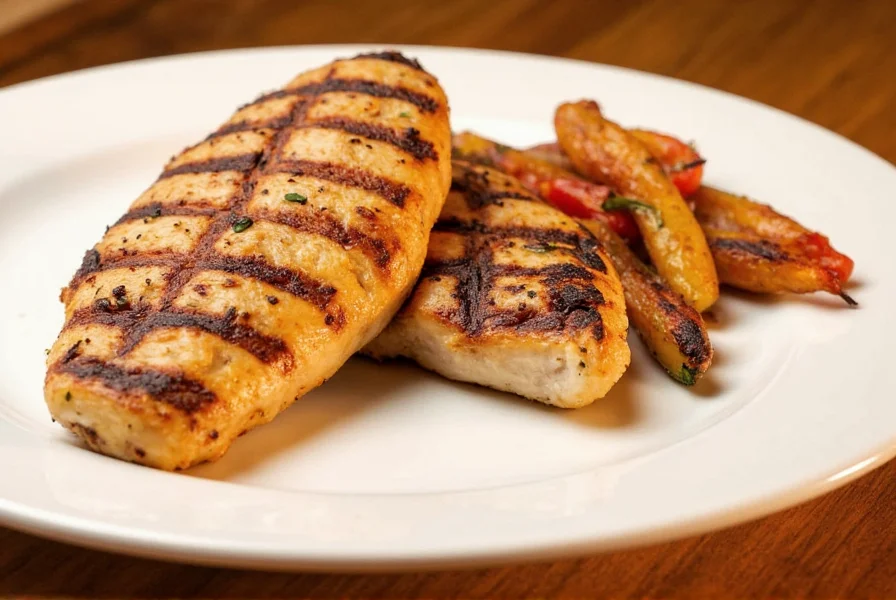
Conclusion
Mastering the best grilled chicken breast recipe isn't just about the ingredients — it's about technique, patience, and understanding how heat, time, and seasoning work together. With the right approach, you'll be wowing friends, family, or even yourself at lunchtime.
From selecting the perfect spice blend to choosing the right tools, this guide equips you with everything you need to grill like a pro. So fire up the grill, grab your tongs, and get ready to impress with juicy, flavorful grilled chicken breasts that steal the show every time.
Happy grilling!

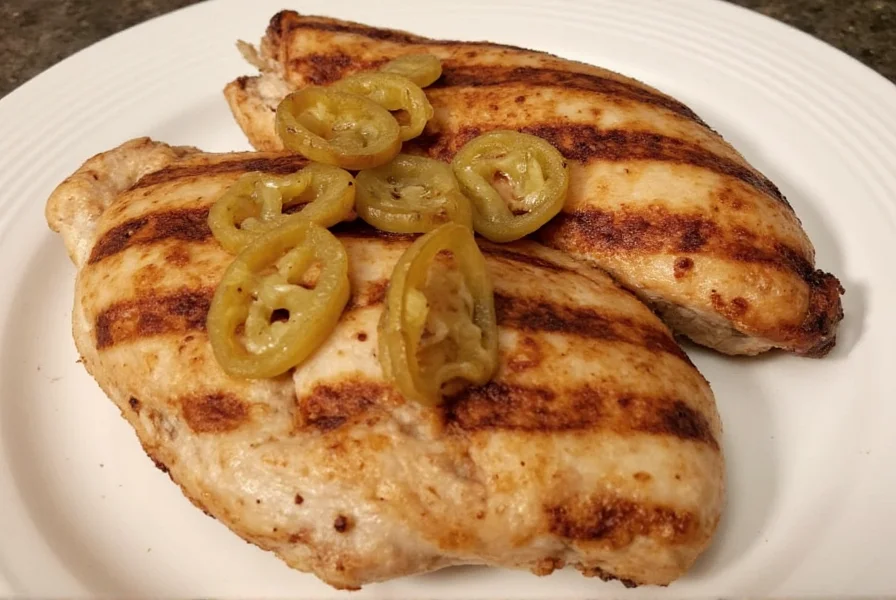









 浙公网安备
33010002000092号
浙公网安备
33010002000092号 浙B2-20120091-4
浙B2-20120091-4